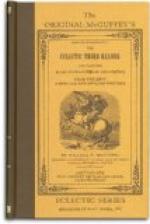[Success Attained]
The two chief combatants at length withdrew with one accord. Neither firm could claim entire victory; but the McGuffey readers came through with much the larger sales and these increased for years. By this contest the firm of Van Antwerp, Bragg & Co. won a reputation as fighters that protected them in after years from ill-considered attacks by its competitors.
The revised edition of the McGuffey Readers, having no author’s name on the title page, designed and compiled under the direction of the publishers, but retaining the moral excellences and literary qualities that had been affixed to the series from its origin, attained the largest sales that have as yet been accorded by the public to a single series of books. Of the Sixth Reader, which must have the least sale, over a million copies have been distributed, as shown by the edition number. Of the First Reader more than eight million copies have been used.
[Other Competitors]
At no time in the history of these readers have they been without formidable competition. Pickett’s Readers were published in Cincinnati as early as 1832. Albert Pickett was at one time president of the College of Teachers and his books were published by John W. Pickett, who was probably his brother. Later some additional books were prepared by John W. Pickett, M.D., LL.D., and published by U.P. James in 1841, and by J. Earnst in 1845. These readers were vigorously pushed into the market for several years, but in the end were unsuccessful.
The Goodrich Readers published by Morton & Griswold in Louisville, Ky., were perhaps the most constant competitors with the McGuffey Readers in the early years throughout the states of the Mississippi Valley. These were prepared by S.G. Goodrich, the author of the then popular “Peter Parley Tales.” The readers were originally published in Boston and some copies bear the imprint of Otis, Broaders & Co. They were first copyrighted in 1839 and were frequently revised. They finally became the property of the Louisville publisher. Mr. Smith and Mr. Morton kept up a most vigorous schoolbook war, especially in Ohio, Indiana and Kentucky in the years from 1845 to 1860. Cobb’s Readers, copyrighted in 1845, were published for some time in Cincinnati by B. Davenport. These were once widely introduced but soon went out of use.
It was very much the custom in those early days, before the railroads made transportation quick and cheap for Eastern publishers to furnish a set of plates to some enterprising bookseller in the West or to print an edition for him with his imprint.
Ebenezer Porter’s Rhetorical Reader copyrighted in 1835 was sold largely in the western market by William H. Moore, of Cincinnati, and in 1848 the books bore his imprint. Thus there was ample competition for the market even at this early date. The Pickett Readers, Cobb Readers, Goodrich Readers, and even the excellent Rhetorical Reader of Ebenezer Porter were all swept out of the schools by the superior qualities of the McGuffey Readers and the persistent energies of their publishers.




